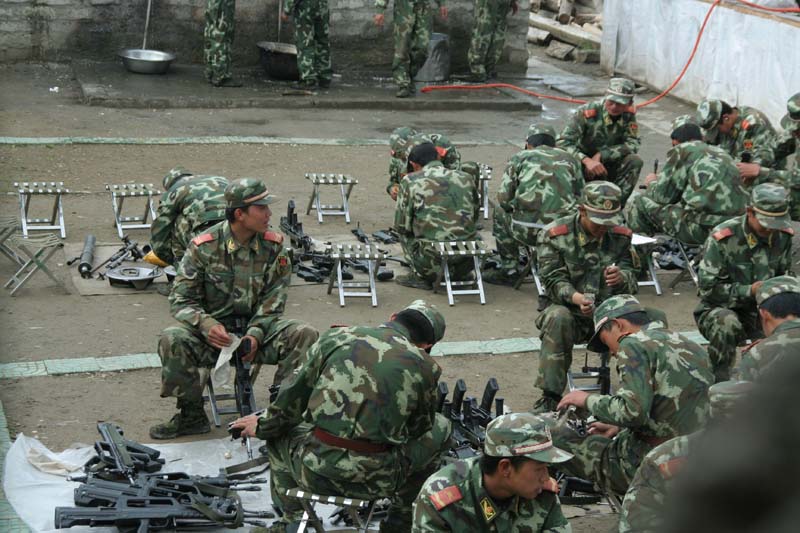 Dharamshala: This article was sent to us by Wen, a Taiwanese-American tourist who visited Lithang County in Eastern Tibet, between the 2008 uprising and the Beijing Olympics. She details her fears as a traveller who had previously visited Dharamsala, and the oppression of the majority Tibetan population of Lithang.
Dharamshala: This article was sent to us by Wen, a Taiwanese-American tourist who visited Lithang County in Eastern Tibet, between the 2008 uprising and the Beijing Olympics. She details her fears as a traveller who had previously visited Dharamsala, and the oppression of the majority Tibetan population of Lithang.
Here in Lithang, a Khampa town in Eastern Tibet (present-day Western Sichuan), fear and paranoia lingers in the air. I've never seen so many police and military personnel in one town.
Last night, at around 11:40 pm, I heard the police yell and pound on every door at my guesthouse. When they reached my room, I was numb with fear. Foreigners are not permitted in the town, and the US embassy in Chengdu have suggested I may be being shadowed and my email being monitored, due to my political involvement in Dharamsala. So I am a little afraid of writing this right now. Should I stop out of fear for my own safety? The embassy have told me to watch our for signs of over-relaxed-looking guys hanging around in corners, smoking, and to balance objects precariously on my laptop so I know if anyone has snuck in to my room to bug my electronics.
Apparently, all the embassy employees have a 'shadower' and all their computers are bugged. Not even the tech specialists know to what extent Chinese intelligence monitor them. The embassy have also told me, contrary to what I thought, I am not protected by my American passport because I am traveling on Taiwanese documents, and China regards Taiwan as one of its provinces.
 So, in the PRC's eyes, they are free to detain me upon any suspicion of 'inciting subversion' - an accusation recently levelled at many activists and writers in China. In the past two years, there have been three cases of Taiwanese Americans being detained by the Public Security Bureau (PSB), in which the US embassy has been refused any access to the detainee.
So, in the PRC's eyes, they are free to detain me upon any suspicion of 'inciting subversion' - an accusation recently levelled at many activists and writers in China. In the past two years, there have been three cases of Taiwanese Americans being detained by the Public Security Bureau (PSB), in which the US embassy has been refused any access to the detainee.
Thankfully, in my case, the police left without incident because I played the 'ignorant tourist'. The next day, I found out the police have frequently raided local hotels, searching for 'suspicious' people. And the Tibetan woman who runs my guesthouse told me hotels in Tibetan areas of Western Sichuan will be shut down for the duration of the Olympics.
So how exactly does the government instill fear in the people of Lithang to gain their obedience? Running beside the town's stupa is a long row of prayer wheels, with a big gap in the wall that looks deliberately created. Through this gap, you can see military personnel going about their business. Two days ago, a big assembly stood there, polishing what looked like rifles; clearly visible as I circumambulated the stupa. Further, at every gas station, at least two guards stand behind sand bags, holding rifles with sharp bayonets
A Tibetan friend told me the military presence has stepped up from minimal to extensive since the protests in March, and in anticipation of the Olympics. Police and soldiers patrol every street and, although the vast majority of the town is Tibetan, every single officer I've seen has been Han. The Chinese also own most of the businesses - I still haven't been able to find a Tibetan-run restaurant.
 Today I counted at least seven police/public security stations within a 1km radius, all with camouflaged, rifle-clutching, bullet-vested guards at the gates. In mainland China, it's estimated there is one police officer to every 14,000 people. In Tibet, it's about one police officer to every 20 people. Recently, in politically sensitive areas of eastern Tibet, that has risen to one police officer to one Tibetan.
Today I counted at least seven police/public security stations within a 1km radius, all with camouflaged, rifle-clutching, bullet-vested guards at the gates. In mainland China, it's estimated there is one police officer to every 14,000 people. In Tibet, it's about one police officer to every 20 people. Recently, in politically sensitive areas of eastern Tibet, that has risen to one police officer to one Tibetan.
PART TWO OF THIS ARTICLE IS IN OPINIONS: VIEWS AND ANALYSIS


![Tibet has a rich history as a sovereign nation until the 1950s when it was invaded by China. [Photo: File]](/images/stories/Pics-2024/March/Tibet-Nation-1940s.jpg#joomlaImage://local-images/stories/Pics-2024/March/Tibet-Nation-1940s.jpg?width=1489&height=878)















